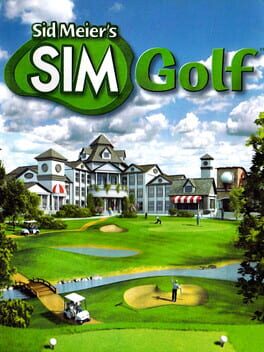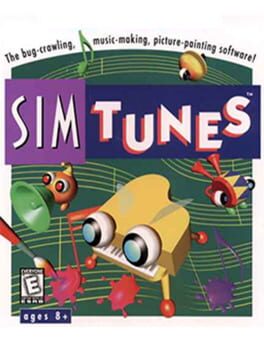

Build a thriving country club and beat the competition in this golf course management simulator from Sid Meier.
Also in series
Reviews View More
Played during the Backloggd’s Game of the Week (8th Aug. – 14th Aug., 2023).
In his memoirs, Sid Meier points out that SimGolf was conceived as an organic fusion of the spirit of Tycoon games and Will Wright's latest hit, The Sims (2000). Unlike the Civilization and SimCity series, SimGolf is intended to be a highly accessible title that hides easy rewards behind artificial complexity. In the words of Jeff Briggs: 'You want [the hole] to look hard, but still play easy' [1]. This gameplay philosophy is not surprising, as it is at the heart of most video games. What makes SimGolf so elegant is the degree to which the game pushes the boundaries of so-called complexity, when in fact everything is remarkably intuitive and requires minimal effort, giving free rein to the player's ideas.
To some extent, this approach to design should be contrasted with the colder, more mathematical approach of SimCity. The latter is built around a set of ideologically driven axioms, presented in Christopher Alexander's A City is Not a Tree (1965) and Jay Forrester's Urban Dynamics (1969), that have a lasting impact on the way players use the tools at their disposal. The use of taxes, for example, responds to strong neo-liberal beliefs that low taxation promotes economic growth, while high taxation necessarily increases the risk of collapse and recession. On the other hand, the title does not take into account recent developments in urban social science on very specific issues such as public lighting, the colours of the city or light mobilities. SimCity is an ideological creation whose rules are sometimes confusing and have prompted the drafting of guides to circumvent them, leading to the emergence of a completely new game through its reception by the public.
The great strength of SimGolf is that it understands the flexibility of simulators and builds its entire design around it. Meier and Briggs' very permissive philosophy leaves all the keys in the hands of the player. Even more than with the other Tycoon games, the creative process is rooted in what the player wants. It is less about creating a course to precise standards - although at a certain point it is preferable to offer a good variety of holes, with layouts that encourage creativity without being too difficult - and more about trusting the player's intuition. A hole that pleases them will undoubtedly please all golfers visiting the resort. This balance is achieved by constantly involving the player's avatar in the design of the golf club. Periodically, they are invited to take part in an open competition within their own structure, a perfect opportunity to empirically assess whether the overall design is effective, in addition to the rather cold financial statistics and volume of critical feedback. As Sid Meier sums it up, the absence of competition pushes back the need for design optimisation and allows the player to focus on other creative aspects [2].
There's something very tangible and personal about SimGolf, whose technique benefits from the graphics engine that would later be used in SimCity 4 (2002), with real 3D models. The game has an almost touching softness, and the low number of visitors compared to other Tycoon games encourages greater contemplation. Even when the course comes under pressure around the creation of a thirteenth hole, due to the formation of bottlenecks on certain complex holes, the game never really punishes the player. Problems can easily be solved by reordering the holes or hiring Marshals. As a rule, the player's investment in the game is constantly rewarded by a larger cash flow without any downside, which makes it easier to modify and create new holes.
While far from the complexity of SimCity and Civilization, SimGolf carries the spirit of unbridled creativity that Sid Meier approached in C.P.U. Bach (1994), a 3DO baroque music generator that, despite lacking any real interactivity, was a veritable hymn to creative freedom. SimGolf extends this concept, using a theme more accessible to the general public and placing itself in the zeitgeist of simulation games at the turn of the 21st century. The result is a curiosity that is both easy to pick up and very supportive of the player and their creativity.
__________
[1] Sid Meier, Sid Meier's Memoir!: A Life in Computer Games, Norton and Company, New York, 2020, p. 147.
[2] Ibid., pp. 147-148.
In his memoirs, Sid Meier points out that SimGolf was conceived as an organic fusion of the spirit of Tycoon games and Will Wright's latest hit, The Sims (2000). Unlike the Civilization and SimCity series, SimGolf is intended to be a highly accessible title that hides easy rewards behind artificial complexity. In the words of Jeff Briggs: 'You want [the hole] to look hard, but still play easy' [1]. This gameplay philosophy is not surprising, as it is at the heart of most video games. What makes SimGolf so elegant is the degree to which the game pushes the boundaries of so-called complexity, when in fact everything is remarkably intuitive and requires minimal effort, giving free rein to the player's ideas.
To some extent, this approach to design should be contrasted with the colder, more mathematical approach of SimCity. The latter is built around a set of ideologically driven axioms, presented in Christopher Alexander's A City is Not a Tree (1965) and Jay Forrester's Urban Dynamics (1969), that have a lasting impact on the way players use the tools at their disposal. The use of taxes, for example, responds to strong neo-liberal beliefs that low taxation promotes economic growth, while high taxation necessarily increases the risk of collapse and recession. On the other hand, the title does not take into account recent developments in urban social science on very specific issues such as public lighting, the colours of the city or light mobilities. SimCity is an ideological creation whose rules are sometimes confusing and have prompted the drafting of guides to circumvent them, leading to the emergence of a completely new game through its reception by the public.
The great strength of SimGolf is that it understands the flexibility of simulators and builds its entire design around it. Meier and Briggs' very permissive philosophy leaves all the keys in the hands of the player. Even more than with the other Tycoon games, the creative process is rooted in what the player wants. It is less about creating a course to precise standards - although at a certain point it is preferable to offer a good variety of holes, with layouts that encourage creativity without being too difficult - and more about trusting the player's intuition. A hole that pleases them will undoubtedly please all golfers visiting the resort. This balance is achieved by constantly involving the player's avatar in the design of the golf club. Periodically, they are invited to take part in an open competition within their own structure, a perfect opportunity to empirically assess whether the overall design is effective, in addition to the rather cold financial statistics and volume of critical feedback. As Sid Meier sums it up, the absence of competition pushes back the need for design optimisation and allows the player to focus on other creative aspects [2].
There's something very tangible and personal about SimGolf, whose technique benefits from the graphics engine that would later be used in SimCity 4 (2002), with real 3D models. The game has an almost touching softness, and the low number of visitors compared to other Tycoon games encourages greater contemplation. Even when the course comes under pressure around the creation of a thirteenth hole, due to the formation of bottlenecks on certain complex holes, the game never really punishes the player. Problems can easily be solved by reordering the holes or hiring Marshals. As a rule, the player's investment in the game is constantly rewarded by a larger cash flow without any downside, which makes it easier to modify and create new holes.
While far from the complexity of SimCity and Civilization, SimGolf carries the spirit of unbridled creativity that Sid Meier approached in C.P.U. Bach (1994), a 3DO baroque music generator that, despite lacking any real interactivity, was a veritable hymn to creative freedom. SimGolf extends this concept, using a theme more accessible to the general public and placing itself in the zeitgeist of simulation games at the turn of the 21st century. The result is a curiosity that is both easy to pick up and very supportive of the player and their creativity.
__________
[1] Sid Meier, Sid Meier's Memoir!: A Life in Computer Games, Norton and Company, New York, 2020, p. 147.
[2] Ibid., pp. 147-148.
Gary Golf is just literally Yuji Naka except that he plays golf instead of getting a prison sentence of two years and six months as well as fines totaling $1.2 million, for his role in an insider trading scheme dating to 2020, as he bought significant shares in game development company Aiming, with secret knowledge of his work on the Dragon Quest Tact mobile game.
Also he's 2 cm taller.
Also he's 2 cm taller.





